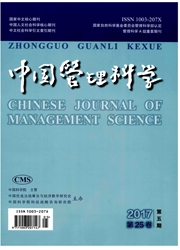

 中文摘要:
中文摘要:
在DEA(数据包络分析)研究领域,建构在交叉效率概念基础上的现有决策单元排序方法仅以定义的方式给出了用于决策单元排序的交叉效率评价值。对于这种方法构建方式,分别基于管理学的效率概念和多属性决策理论,分析指出其中的交叉效率评价值从本质上讲既与效率的管理学概念不符,也与决策单元的优劣不存在理性逻辑联系。为克服现有决策单元排序方法所存在的上述问题,基于交叉评价策略和效率的管理学概念内涵给出了DEA全局协调相对效率的新概念,在此基础上利用优化理论给出了可以用于决策单元优劣排序的DEA全局协调相对效率测度模型,并通过理论分析和数值案例验证解释了该模型相对于现有决策单元排序方法所拥有的比较优势。
 英文摘要:
英文摘要:
In the field of data envelopment analysis (DEA), methods for ranking decision making units (DMUs) ,which are based on crass-efficency, only give evaluation-score (CEES) of DMUs by such a defi- nition of cross-efficency. As for this method-construction pattern, this paper has pointed, by reference to the theoretical concept of efficiency in the domain of management and the theory of multiple attribute deci- sion-making, that the CEES of DMUs not only doesn't match the managerial concept of efficiency, but al- so does make no sense to reflect the goodness or badness of DMUs. In order to overcome these problems mentioned above, a new concept of DEA overall-coordinating relative efficiency is proposed based on a cross-evaluation strategy and the managerial concept of efficiency. According to this new concept, based on the optimization theory, a new model is presented in this paper to measure the DEA overall-coordinating relative efficiencies of DMUs, which can be applied to rank DMUs. Theoretical and numerical analysis also shows that the new model has several comparative advantages over current methods for ranking DMUs.
 同期刊论文项目
同期刊论文项目
 同项目期刊论文
同项目期刊论文
 期刊信息
期刊信息
